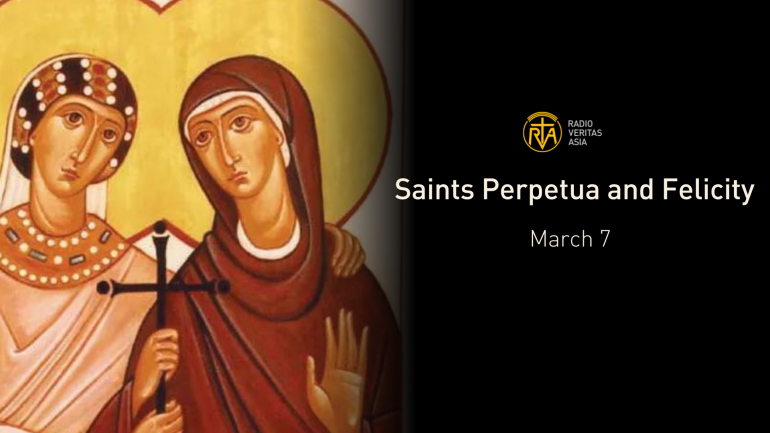Sts. Perpetua and Felicity: Mothers who martyred for Christ

The Roman emperor Septimius Severus ordered the persecution of Christians in the 2nd century. In 203, two Christian mothers found themselves imprisoned because they refused to renounce their faith and both willingly shed their blood for Christ: Saints Perpetua and Felicity, whose feast day we celebrate on March 7.
Perpetua was born into a rich noble family in Carthage, now part of northern Africa's Tunisia. As a young mother, the growing Christian community in her city drew her to faith.
In 201, Emperor Severus began enforcing the persecution of converts to Christianity and Judaism. In 203, the Carthaginian governor, Hilarian, followed suit. Authorities arrested Perpetua for violating the laws of the Roman Empire. Four men and a pregnant slave woman named Felicity joined him in prison.
At prison, Perpetua spent most of her time praying to God and writing in her diary. She wrote about her days in captivity: “What a day of horror! Terrible heat, owing to the crowds! Rough treatment by the soldiers! To crown all, I was tormented with anxiety for my baby,” she wrote.
Perpetua’s father also visited her in prison to urge her to let go of her faith. She firmly refused. In her diary, she recalled having told her father, “I cannot be called anything other than what I am: a Christian.”
Aside from her personal experiences, Perpetua described the prophetic visions she had behind bars. In one of her dreams, she saw her death in the arena and her glorious entry into heaven.
Her diary also recorded how her fellow prisoner, Felicity, delivered her baby while in prison. Upon giving birth, Felicity rejoiced, knowing this would lead to her execution alongside the other prisoners. At the time, the authorities did not allow killing pregnant women in the amphitheatre games and instead subjected them to a different method of execution.
The night before their deaths, Perpetua handed over her diary to another Christian and urged him to record their martyrdom. “Of what was done in the games themselves, let him write who will,” wrote Perpetua in her final diary entry.
This Christian recorded everything that happened the next day in the amphitheater games. He described how Perpetua, Felicity, and the four men trembled as they came out in front of the jeering crowd. But he stated that it was not because of fear; it was joy in the Holy Spirit.
After scourging them, the guards released wild animals: a boar, a leopard, and a bear for the men, and a wild cow for the women. The writer recalled how Perpetua tried to cover herself when the animals tore her tunic apart, and she even asked for a pin to fasten her untidy hair. “It was not right that a martyr should die with her hair in disorder,” he wrote.
After the beasts wounded them, the executioners beheaded the prisoners, following an exchange of the kiss of peace.
The writer described how Perpetua fearlessly welcomed death: “She took the trembling hand of the young gladiator and guided it to her throat. It was as though such a great woman, feared by the unclean spirit, could not be dispatched unless she were willing.”
The saint’s diary, posthumously published as The Passion of Saints Perpetua and Felicity, became an influential document in building early Christian communities. It was instrumental in converting non-believers to the Church, who were inspired by the women’s bravery and perseverance. The two holy women were among the martyrs commemorated by name in the Roman Canon.
The writer who completed Perpetua’s diary honored the saints at the end of the book: “Ah, most valiant and blessed martyrs! Embrace your calling and election for the glory of our Lord, Christ Jesus! And any man who exalts, honors, and worships His glory should read for the consolation of the Church these new deeds of heroism, which are no less significant than the tales of old.”
Radio Veritas Asia (RVA), a media platform of the Catholic Church, aims to share Christ. RVA started in 1969 as a continental Catholic radio station to serve Asian countries in their respective local language, thus earning the tag “the Voice of Asian Christianity.” Responding to the emerging context, RVA embraced media platforms to connect with the global Asian audience via its 21 language websites and various social media platforms.














